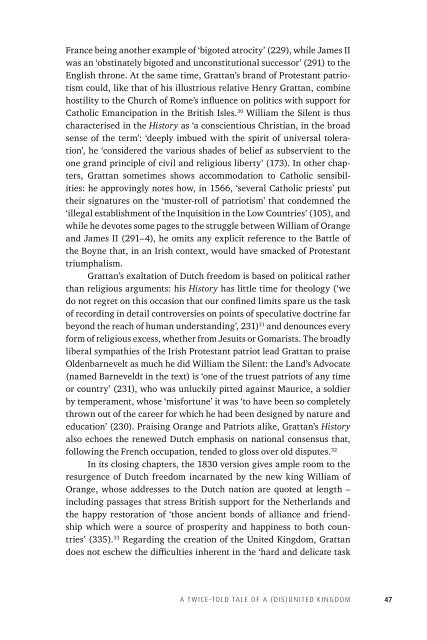Discord Consensus
7aze300jFJo
7aze300jFJo
You also want an ePaper? Increase the reach of your titles
YUMPU automatically turns print PDFs into web optimized ePapers that Google loves.
France being another example of ‘bigoted atrocity’ (229), while James II<br />
was an ‘obstinately bigoted and unconstitutional successor’ (291) to the<br />
English throne. At the same time, Grattan’s brand of Protestant patriotism<br />
could, like that of his illustrious relative Henry Grattan, combine<br />
hostility to the Church of Rome’s influence on politics with support for<br />
Catholic Emancipation in the British Isles. 30 William the Silent is thus<br />
characterised in the History as ‘a conscientious Christian, in the broad<br />
sense of the term’: ‘deeply imbued with the spirit of universal toleration’,<br />
he ‘considered the various shades of belief as subservient to the<br />
one grand principle of civil and religious liberty’ (173). In other chapters,<br />
Grattan sometimes shows accommodation to Catholic sensibilities:<br />
he approvingly notes how, in 1566, ‘several Catholic priests’ put<br />
their signatures on the ‘muster-roll of patriotism’ that condemned the<br />
‘illegal establishment of the Inquisition in the Low Countries’ (105), and<br />
while he devotes some pages to the struggle between William of Orange<br />
and James II (291–4), he omits any explicit reference to the Battle of<br />
the Boyne that, in an Irish context, would have smacked of Protestant<br />
triumphalism.<br />
Grattan’s exaltation of Dutch freedom is based on political rather<br />
than religious arguments: his History has little time for theology (‘we<br />
do not regret on this occasion that our confined limits spare us the task<br />
of recording in detail controversies on points of speculative doctrine far<br />
beyond the reach of human understanding’, 231) 31 and denounces every<br />
form of religious excess, whether from Jesuits or Gomarists. The broadly<br />
liberal sympathies of the Irish Protestant patriot lead Grattan to praise<br />
Oldenbarnevelt as much he did William the Silent: the Land’s Advocate<br />
(named Barneveldt in the text) is ‘one of the truest patriots of any time<br />
or country’ (231), who was unluckily pitted against Maurice, a soldier<br />
by temperament, whose ‘misfortune’ it was ‘to have been so completely<br />
thrown out of the career for which he had been designed by nature and<br />
education’ (230). Praising Orange and Patriots alike, Grattan’s History<br />
also echoes the renewed Dutch emphasis on national consensus that,<br />
following the French occupation, tended to gloss over old disputes. 32<br />
In its closing chapters, the 1830 version gives ample room to the<br />
resurgence of Dutch freedom incarnated by the new king William of<br />
Orange, whose addresses to the Dutch nation are quoted at length –<br />
including passages that stress British support for the Netherlands and<br />
the happy restoration of ‘those ancient bonds of alliance and friendship<br />
which were a source of prosperity and happiness to both countries’<br />
(335). 33 Regarding the creation of the United Kingdom, Grattan<br />
does not eschew the difficulties inherent in the ‘hard and delicate task<br />
A twice-told tale of a (dis)united kingdom 47


